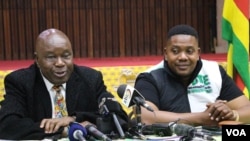Zimbabwe’s ruling ZANU-PF party is reacting angrily to a new visa restriction policy which U.S. Secretary of State Antony Blinken announced this week, aimed at people accused of undermining democracy in the southern African nation. The opposition is berating the United States for the latest move.
Lawrence Socha, spokesperson at the U.S. Embassy in Harare, told VOA that the new visa restriction policy would affect individuals believed to be responsible for or complicit in undermining democracy.
He said that may include manipulating or rigging the electoral process, disenfranchising voters, restricting the work of civil society organizations, or intimidating voters.
“Such acts might also include engaging in corruption, including bribery that undermines the electoral process, interfering with the independent operation of the judiciary, or abusing or violating human rights in Zimbabwe,” said Socha. “The visa restriction policy will apply to specific individuals involved in these acts, and it is not directed at the Zimbabwe in people. The United States supports Zimbabwe’s aspirations to have free and fair elections that reflect the will of the people and strengthen democracy, the rule of law, and the protection of human rights.”
Zimbabwe’s August general election was marred by delays and shortages of materials in the opposition’s strongholds. Many observer missions – including from the Southern African Development Community, said the process fell far short of requirements of the country’s electoral laws as well as the regional bloc’s guidelines.
Jonathan Moyo, a former government minister in Zimbabwe, says the new restrictions are meant to make citizens revolt against their government after the Zimbabwe Democracy and Economic Recovery Act of 2001, known as ZIDERA, failed to do so. Then-U.S. President George W. Bush signed into law the measure aimed at promoting economic growth and the rule of law.
“An objective empirical assessment of this latest measure is really an admission first and foremost that ZIDERA has failed, that the Americans have become hopeless, the Americans, the meaning of the American government, have become jittery, and they now are resorting to legal instruments that were there in 2001 but now they think they can achieve what they’ve failed to achieve through Zidera,” said Moyo.
Farai Muroiwa Marapira, a ZANU-PF spokesman, voiced agreement with Moyo.
“As ZANU-PF, we are not surprised by this new activity by the American government. We all know their intent on changing the government,” said Marapira. “And all their machinations having failed in August, some tantrums are expected and this is what is obtaining. We remain unfazed and remain resolute. We hold on to the words of wisdom from our president; President ED Mnangagwa. We are an enemy to none and a friend to all and our doors are open.”
Moyo says he doubts the new U.S. visa restrictions will have any impact.
However, Promise Mkwananzi, the spokesman for the country’s main opposition party, the Citizens’ Coalition for Change, is more hopeful.
“We note the measures taken by the Americans against the authors and sponsors of chaos, illegitimacy and illegality in Zimbabwe,” said Mkwananzi. “I think it is important not just for the American government but as well as other governments, regional bodies such as SADC and others to ensure that they put some disincentives against people who would want to undermine the will of the people of Zimbabwe and disrespect at the voice of the Zimbabwean people, including of course those that are not in ZANU-PF, but who are complicit with the regime in undermining the wishes and the will of the people of Zimbabwe.”
The opposition says it is still hopeful that regional body SADC will call for fresh polls following the chaos which characterized Zimbabwe’s August elections.

